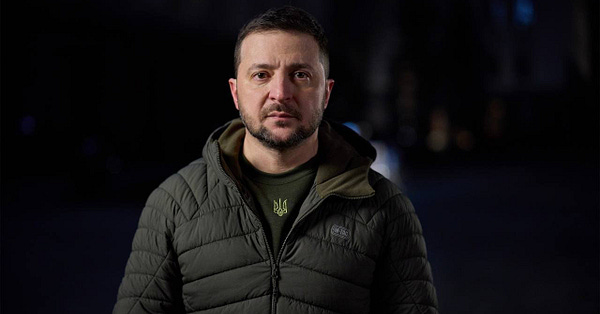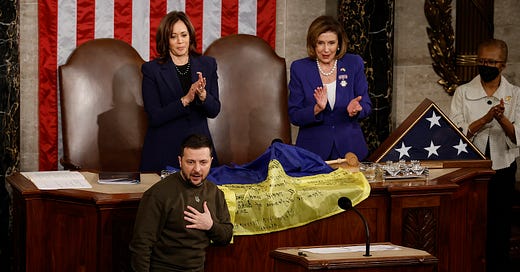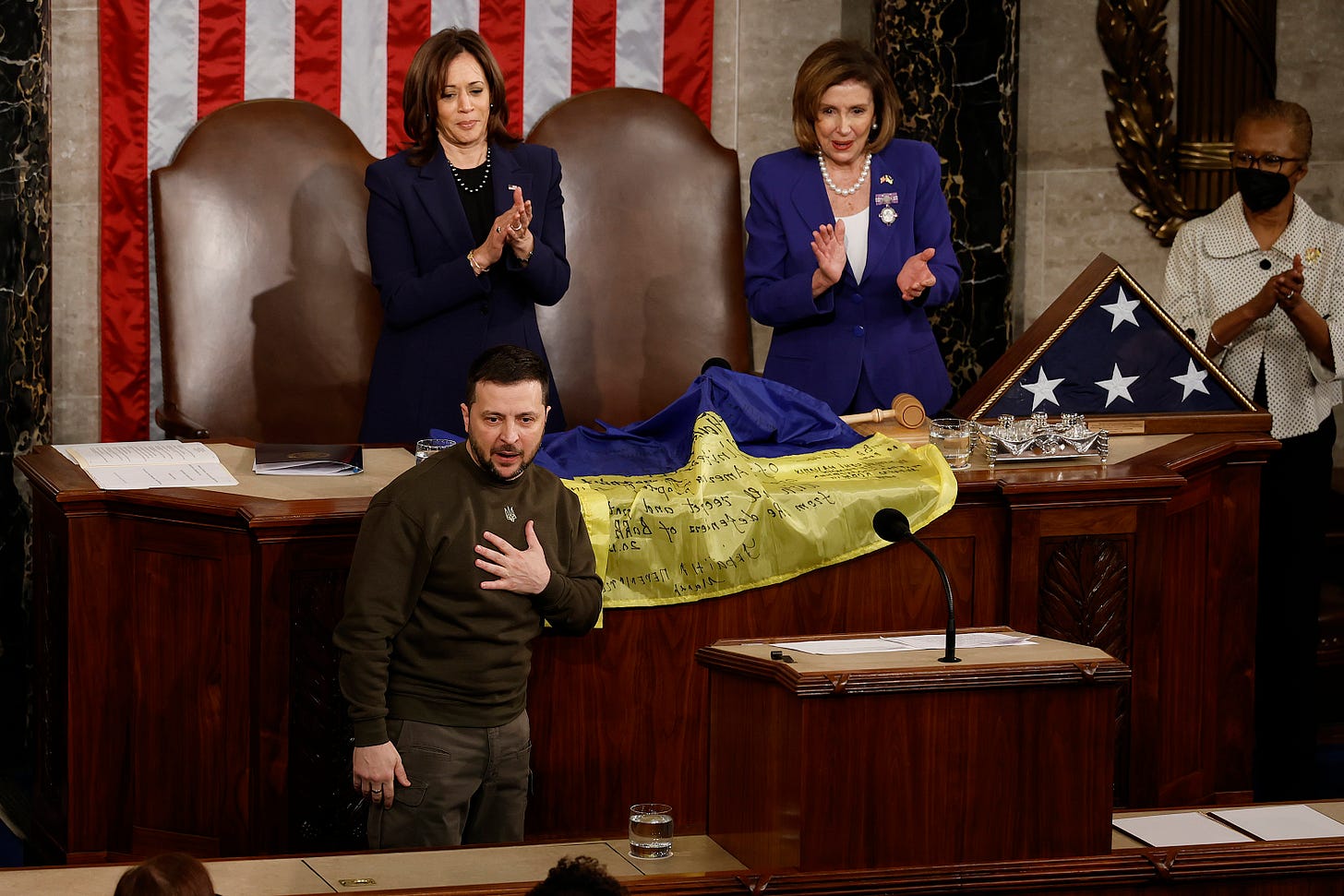2022 Was the Year of Victory for Ukraine and Defeat for Russia
But the outcome of 2023 will depend in part on us
Putin is a blunt speaker – no flowery language or diplo-speak. I was often in meetings with him during my time at the National Security Council and the U.S. Embassy in Moscow. Compared to other Russian interlocutors, Putin is more straightforward and often uses crude, simple phrases. Unsurprisingly, in the run-up to his invasion of Ukraine, Putin spelled out precisely what he aimed to achieve. No need to ask the CIA or master Kremlinologists to decipher his intentions, just read his July 12, 2021 essay about Ukraine or listen to (or read) his 70-minute television address to the Russian people just days before the invasion.
He stated several goals. Most ambitiously, he aimed to rid the world of Ukraine entirely. For him, Ukraine is neither a separate national identity nor a sovereign state. Ukrainians are just Russians with accents. Putin aims to reverse, in his eyes, the historical mistakes made by the West and the Bolsheviks that divided the two groups and reunite a single Slavic nation.
As such, the initial “special military operation” was very broad in scope, aiming to seize all of Ukraine. His first targets were many cities at once; the Ukrainian capital, Kyiv, and the second largest city, Kharkiv, among others.
Regime change was a second, related objective. He aimed to achieve “denazification” and overthrow Zelenskyy’s government - even though Zelenskyy is not a Nazi, but a democratically elected leader of Jewish descent.
Another goal was the “demilitarization” of Ukraine so that it cannot threaten Russia, even though the Ukrainian army had never made plans to launch such a suicidal attack against the largest country in the world, armed with nuclear weapons.
Finally, Putin invaded Ukraine to stop NATO expansion. Putin already had delayed NATO expansion in the former Soviet Union by invading Georgia in 2008 and Ukraine in 2014. While publicly affirming NATO’s open-door policy, European and U.S. leaders privately expressed little enthusiasm for inviting Ukraine to join the Organization. But Putin was not satisfied with that ambiguous outcome. He believed a second intervention in Ukraine was needed to seal the deal.
In 2022, Putin failed to achieve any of his war aims. His war so far has been a colossal failure.

Putin’s war did not unite the Slavic nation. Instead, Putin has triggered an increased codification of a greater, independent, Ukrainian national identity. Polls show that two months after the start of the invasion, 94% of Ukrainians ‘somewhat approved’ or ‘strongly approved’ of Zelenskyy’s actions and 97% stated that Ukraine would ‘likely win’ or ‘definitely win’ the war.
Conquering all of Ukraine failed miserably. After some initial seizing of new territories, Russia lost all the big battles – the Battle for Kyiv, the Battle of Kharkiv, and was pushed out of Kherson. Analysts estimate that Russia has lost control of roughly 50% of the territory it had conquered.



Consequently, Putin modified his war aims, stating months later that it was a “special military operation in defense of Donbas.” But even that more limited aim has not been achieved. In a grand ceremony in the Kremlin in September, followed by fireworks on Red Square, Putin proclaimed on paper that he had annexed four regions, including those that make up Donbas. But on the ground, Russia still does not occupy these territories. Even Putin’s more modest “defense of Donbas” war objective has failed so far.
Putin also did not overthrow Zelenskyy and did not achieve regime change. He tried. He sent assassination teams into Kyiv, but they failed. Ukrainians are rallying around their leader, the Zelenskyy government remains in power and enjoys more support than ever, both at home and worldwide.
Putin obviously did not demilitarize Ukraine in this time of war. The level of American and European military assistance is gigantic – and will not end anytime soon.
And rather than limiting NATO expansion, Putin’s invasion provoked it. Sweden and Finland will soon join. Even during the Cold War, these countries stayed neutral. No more. And without question, Ukraine will have a deeper relationship with NATO after this war than before the war. Even vocal critics of NATO expansion agree. As Henry Kissinger, one of those vocal critics wrote recently,
This process has mooted the original issues regarding Ukraine’s membership in Nato. Ukraine has acquired one of the largest and most effective land armies in Europe, equipped by America and its allies. A peace process should link Ukraine to Nato, however expressed. The alternative of neutrality is no longer meaningful, especially after Finland and Sweden joined Nato.
I’m sure Putin will be shocked to read this from his long-time interlocutor.
In failing to achieve any of his war objectives in 2022, Putin also has amassed major costs for Russia’s security and economy. His military – once thought to be one the three largest in the world – is in tatters. The loss of human life and hardware has been enormous and will take years if not decades to recover to pre-invasion levels. Because of international sanctions, Russia’s economy has suffered short-term losses, which will be followed by even more devastating long-term costs. Thousands of international companies have pulled out of Russia; few will return. Even China is not daring to violate this sanctions regime yet and is cutting Russia off from critical technologies it cannot produce at home. Putin’s war also triggered a mass wave of emigration of Russia’s best and brightest—a brain drain that will have enduring costs for Russia’s economy.
Ukrainian victory in 2022 required incredible sacrifice. Large numbers of soldiers and civilians have died, and tons of property destroyed. Not all territory is back in Ukrainian hands. With his threats of nuclear weapons use, Putin has successfully deterred the United State and NATO from providing certain kinds of offensive weapons systems, like long-range rockets (ATCMS), fighter jets, and tanks. But these small achievements are eclipsed by his colossal failures in 2022. Ukraine won this war in 2022. Russia lost.
Winning the first year of this war does not guarantee ultimate victory for Ukraine. But Ukrainian resolve to keep winning in 2023 is firm. As President Zelenskyy said in his New Year’s greetings:
Is there anything that can scare us? No. Is there anyone who can stop us? No.
Because we are all together.
It is what we are fighting for. One for each other. (…)
We do not know for sure what the new year 2023 will bring us. But ready for anything.
New achievements? We will be happy. New hits? We will be steadfast.
Continuation of the fight? We will fight. And when we win, we will hug.


But Ukrainians cannot win in 2023 without more assistance from the West. That will be the subject of my next piece here.





In the spirit of transparency, I updated this piece just now based on useful feedback from the first draft. As I said in my opening post here, this is a space for "first drafts" for me. If that concerns you, you can read my many multiple final drafts other places, including at Wapo today, Im not here on this platform to play gotcha games. Im here to learn and get smarter.
Ive seen some estimates. Ill try to track them down and post.